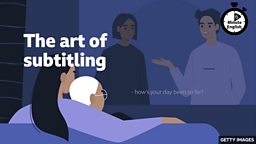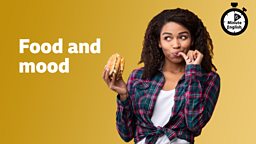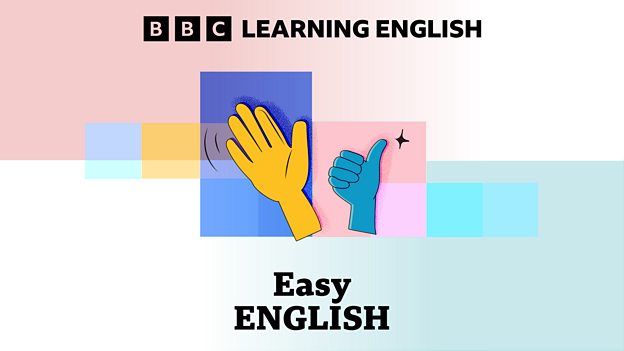6 Minute English
Intermediate level
Losing your mother tongue
Episode 230302 / 02 Mar 2023

Introduction
What does it mean for a child refugee to lose their first language? Sam and Rob hear the story of a woman who could no longer speak her native Czech after her family left their home country. Now she speaks English. We talk about leaving a language behind and teach you new vocabulary along the way.
This week's question
According to the United Nations, how many people around the world are currently living as displaced refugees?
a) 3 million
b) 53 million
c) 103 million
Listen to the programme to find out the answer.
Vocabulary
mother tongue
native language; the first language you learn from your parents as a child
(someone is) dunked into
suddenly placed into a new, unfamiliar situation for a short time before being removed again
have faith
have confidence or trust in something or someone
sort itself out
(phrasal verb) stop being a problem without anyone having to do anything
full-fledged
complete; fully developed
either-or
situation where only a choice between two options, with no third alternative, is possible
TRANSCRIPT
Note: This is not a word-for-word transcript.
Sam
Hello. This is 6 Minute English from BBC Learning English. I’m Sam.
Rob
And I’m Rob.
Sam
In this programme, we’ll be hearing about an issue experienced by many child refugees who are forced to leave their home – the loss of their first, native language, or mother tongue, as they start a new life, learning to speak a new language, in a new country.
Rob
Julie Sedivy and her family left their home in what was then Czechoslovakia and is now the Czech Republic during the Cold War, when Julie was a small child. After several years travelling through Europe, they arrived in Canada as political refugees with no English. We’ll be hearing about Julie’s childhood when learning English started to replace her native language, Czech, and, as usual, we’ll be learning some new vocabulary as well.
Sam
But first, I have a question, Rob. Julie’s family left their home as political refugees, but every year millions of people are also displaced because of war, persecution, or the damaging effects of climate change. So, according to the United Nations, how many people around the world are currently living as displaced refugees? Is it:
a) 3 million?
b) 53 million? or,
c) 103 million?
Rob
I’ll guess it’s 103 million.
Sam
I’ll reveal the answer later in the programme, Rob. Like many child refugees, Julie spoke only her mother tongue, Czech, at home with her brothers, sisters and parents who, in the beginning, spoke no English at all. Here she describes to Michael Rosen, presenter of BBC Radio 4 programme, Word of Mouth, going to an English-speaking school for the first time.
Michael Rosen
…so, you went into school not, to start off, with really understanding what was going on, is that right?
Julie Sedivy
That's right. I just kind of interpreted things as best I could, and my memory of that is that that was not particularly difficult or traumatic. I think by then I'd had the experience of being dunked into various unfamiliar languages numerous times, and I had faith that it would sort itself out, and that everything would be just fine; and it was of course…
Rob
At school, Julie was dunked into unfamiliar situations, a bit like a biscuit being dunked into a cup of tea. Often, dunk means to dip something into liquid, but here, the meaning is that Julie was suddenly dropped into a new situation for a while, then taken out, as her family travelled through Europe.
Sam
By the time she arrived in Canada, Julie had been exposed to several other languages including Italian and French. She had experienced many difficulties, but never given up hope of finding a new home. Julie had faith – in other words, trust or confidence, that everything would sort itself out, a phrase meaning to stop being a problem automatically, without having to do anything.
Rob
Over the following years, Julie faced many challenges: going to school and making friends; helping her parents as they struggled in the English-speaking world; and grieving for her native language which she slowly forgot, and with it, the chance to speak Czech with her dad before he passed away. Julie shares her thoughts on losing and refinding her mother tongue in her book, Memory Speaks.
Sam
Through it all, Julie kept alive her belief that by speaking two, three or even more languages, we don’t forget who we are, but instead gain a sense of tolerance, an idea which she talked about with BBC Radio 4’s, Word of Mouth.
Julie Sedivy
The idea that you can be both of Mexican ancestry, for example, and speak Spanish, and be a full-fledged American, or in my case come from a country like the Czech Republic, continue to speak my language and to be a Canadian and very proudly so and very invested in Canada as a society. There's a number of studies that suggest that the very presence of people with blended ideas in a society seem to lead to greater acceptance between groups. It creates the sense that this is not an either-or, that we can coexist, perhaps precisely because we have evidence that these cultures can coexist within a single person.
Rob
For Julie, there’s no contradiction in being a Canadian refugee speaking Czech, or a Spanish-speaking immigrant who’s a full-fledged – or fully developed – American. These are not either-or situations – cases where there is only a choice between two options, with no third possibility. Instead, a peaceful coexistence can develop, as shown in the life of Julie Sedivy herself.
Sam
Right. it’s time to reveal the answer to my question: how many people around the world, like Julie, are living as displaced refugees?
Rob
Well, I said it was 103 million. Was I right?
Sam
And that was the correct answer, Rob, a number which, according to UN, is only going to grow. Now it’s time to recap the vocabulary we’ve learned from this programme about losing our mother tongue – the native language you were brought up speaking by your parents.
Rob
If something is dunked, it’s dipped into a liquid, like a biscuit in a cup of tea, but if someoneis dunked into a situation, they’re suddenly placed into a new and unfamiliar setting before being removed again after a short time.
Sam
If you have faith in something or someone, you have trust or confidence in them.
Rob
The phrasal verb to sort itself out, means to stop being a problem without having to do anything.
Sam
The adjective full-fledged means completely developed.
Rob
And finally, an either-or is a situation where only a choice between two options is possible, with no third alternative.
Sam
And that brings us to the end of this programme. Bye for now!
Rob
Bye bye!
Latest 6 Minute English

Sexism: Female farmers fighting back
Episode 231228 / 28 Dec 2023
How can female farmers beat rural sexism?



Invasive species: Why don't we eat them?
Episode 231207 / 07 Dec 2023
Could we eat invasive species?

What and where is Little Italy?
Episode 231130 / 30 Nov 2023
Mozzarella, ricotta, cannolis and focaccia... Where are we? Little Italy of course!

Social media and teenage health
Episode 231123 / 23 Nov 2023
What are the health risks of social media for teenagers?








Sounds that make you want to scream
Episode 230928 / 28 Sep 2023
Are there any sounds you find upsetting?




The stories behind our names
Episode 230831 / 31 Aug 2023
What do our names reveal about our culture and family history?


Are you unhappy at work?
Episode 230817 / 17 Aug 2023
Does work leave you feeling bored and exhausted?







Is it wrong to eat plants?
Episode 230629 / 29 Jun 2023
Should we treat plants with the same consideration we treat animals with?



The art of subtitling
Episode 230608 / 08 Jun 2023
Hear how subtitles can help bring TV and movies to life

Ecotourism: good or bad?
Episode 230601 / 01 Jun 2023
We discuss the growing popularity of ecotourism.

Can climate change cause more disease?
Episode 230525 / 25 May 2023
With warming temperatures, mosquitos are now spreading to new areas, including Europe.



Ice and the origins of life on Earth
Episode 230504 / 04 May 2023
We talk about an essential element for life to thrive.

Women in politics
Episode 230427 / 12 Apr 2023
We discuss some of the reasons why women make up only 26% of the world's politicians.

What's the point of museums?
Episode 230420 / 20 Apr 2023
We discuss the role of museums in the 21st century and the items taken from different countries.

How culture affects sadness
Episode 230413 / 11 Apr 2023
What ways do you think culture can influence sadness?

Would you eat a Kalette?
Episode 230406 / 06 Apr 2023
Hear about a new kind of vegetable making an entrance in British kitchens

Do you get jealous easily?
Episode 230330 / 06 Mar 2023
Let's talk about the ugly green-eyed monster


Food and mood
Episode 230316 / 16 Mar 2023
We look at the link between what you eat and how you feel.

How to talk to a climate denier
Episode 230309 / 09 Mar 2023
The dos and don'ts of trying to discuss science with someone who doesn't believe in it

Losing your mother tongue
Episode 230302 / 02 Mar 2023
Hear the story of a woman who replaced her native Czech for English.

The health benefits of apples
Episode 230223 / 23 Feb 2023
Could 'an apple a day keep the doctor away'?


Doomscrolling: Why do we do it?
Episode 230209 / 27 Jan 2023
What is doomscrolling and why are we attracted to bad news? Listen to find out!

Exercise for the lazy
Episode 230202 / 22 Jan 2023
What's the least amount of exercise you should do to stay healthy?

Can AI have a mind of its own?
Episode 230126 / 26 Jan 2023
Hear about the software engineer who became 'friends' with his computer

Climate change: Are there too many people?
Episode 230119 / 13 Jan 2023
Does the size of your carbon footprint depend on where in the world you were born? Listen to find out!

The hidden life of buffets
Episode 230112 / 12 Jan 2023
Neil and Sam discuss buffet meals and the history behind them.

Songwriting
Episode 230105 / 05 Jan 2023
Writing a memorable song isn't easy. So is there an art to good songwriting?







